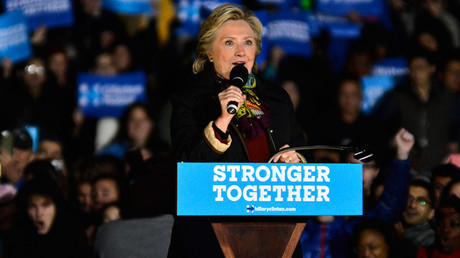FBI informant allowed to testify in Congress on Hillary Clinton’s ‘role’ in Russia uranium deal

The Justice Department lifted a gag order on an FBI informant to speak to Congress about a 2010 deal that saw 20 percent of US uranium supply sold to a Russian company. It comes amid claims that bribes were paid to then-Secretary of State Hillary Clinton.
The informant has been greenlit to disclose “any information or documents he has concerning alleged corruption or bribery involving transactions in the uranium market including but not limited to anything related to Vadim Mikerin [an executive for the Russian nuclear firm Tenex], Rosatom, Tenex, Uranium One, or the Clinton Foundation,” Department of Justice (DOJ) spokeswoman Sarah Isgur Flores said, as cited by the Hill.
A respective request to let the informant testify was made last week by Iowa Sen. Charles Grassley, who is also the Republican chairman of the Senate Judiciary Committee.
“The executive branch does not have the authority to use non-disclosure agreements to avoid congressional scrutiny,” Grassley said in a letter to the DOJ, adding that if the FBI is allowed to contract itself out of Congressional oversight, it would “seriously undermine our Constitutional system of checks and balances.” The lawmaker stressed that the DOJ needs to make sure that witnesses are “free to speak without fear, intimidation or retaliation from law enforcement."
On Tuesday, the Republican chair of the House Intelligence Committee, Rep. Devin Nunes (R-California) announced a probe into the 2010 deal and any role Clinton had allegedly played in it. Nunes, who previously stepped down from the investigation into alleged Russian meddling in the 2016 election, said the probe into Uranium One would be conducted by the House Intelligence Committee and the House Oversight Committee.
The investigations were triggered by a report from The Hill, which claimed the FBI had uncovered “substantial evidence” that Russian nuclear industry officials had allegedly bribed a US uranium trucking firm (Transport Logistics International) before the Uranium One deal was approved. Sources told The Hill that federal agents obtained, among other things, an “eyewitness account backed by documents indicating Russian nuclear officials had routed millions of dollars” to the US meant to “benefit Bill Clinton’s charitable foundation” at the time his wife, Hillary, served on a government body “that provided a favorable decision to Moscow.”
Clinton rejected the charge, calling the allegations “baloney,” arguing that there has been “no credible evidence by anyone.” She argued that the investigation is being used to draw attention away from the inquiry into the Trump campaign. US President – who has on several occasions slammed the agreement by saying that Clinton “was paid a fortune” to set up the sale – has recently called out the “Fake Media” for ignoring “one of the big stories of the decade,” referring to the deal made under Clinton.


0 Comments:
Post a Comment
Subscribe to Post Comments [Atom]
<< Home